Apple's 2010 MacBook Air (11 & 13 inch) Thoroughly Reviewed
by Anand Lal Shimpi on October 26, 2010 10:08 PM EST- Posted in
- Mac
- Apple
- MacBook Air
- Laptops
The 11-inch MacBook Air: Faster than the old 13-inch MacBook Air
On paper, the new 13-inch MacBook Air shouldn’t be any faster than the old 2008 MacBook Air - at least in CPU bound tasks. The 2010 model gets a faster GPU but the CPU is literally the same 1.86GHz Core 2 Duo. Memory sizes and speeds haven’t changed either. While the SSD is faster, if you’re running a CPU bound benchmark there shouldn’t be any performance difference. If you assumed the same thing I did, you’d be very wrong.
Take a look at Cinebench 11 comparing the 2008 13-inch MacBook Air to the two 2010 models:
| Cinebench 11 - Multithreaded CPU Benchmark | |||||
| 11-inch MacBook Air (2010) - 1.4GHz Core 2 Duo | 13-inch MacBook Air (2010) - 1.86GHz Core 2 Duo | 13-inch MacBook Air (2008) - 1.86GHz Core 2 Duo | |||
| Cinebench 11 Score (Higher is Better) | 0.81 | 1.1 | 0.70 | ||
Not only is the 2008 13-inch MBA slower than the new 13-inch model, it’s actually slower than the 11-inch model running at 1.4GHz. Something is amiss. Perhaps it’s just this benchmark?
I turned to our Handbrake H.264 encode test to verify my sanity:
| Handbrake 0.94 - H.264 High Profile Transcode | |||||
| 11-inch MacBook Air (2010) - 1.4GHz Core 2 Duo | 13-inch MacBook Air (2010) - 1.86GHz Core 2 Duo | 13-inch MacBook Air (2008) - 1.86GHz Core 2 Duo | |||
| Average Frames per Second (Higher is Better) | 1.14 fps | 1.55 fps | 0.96 fps | ||
Once again, a similar situation. The old MBA is actually slower than the new 11-inch, despite the advantage in CPU speed.
It looks like what we’ve stumbled upon is a combination of Apple aggressively throttling the clock speed of the older MacBook Air CPUs to meet thermal requirements, and the CPUs used in the new MacBook Airs being far better behaved from a voltage/power consumption standpoint.
The 45nm process these Core 2s are built on is as mature as it’s going to get. I’m guessing yield on these parts is as high as can be and as a result, power consumption is probably consistently lower than the original 1.86GHz parts Apple shipped back in 2008. The peak thermal specs themselves haven’t changed, but the actual power characteristics have.
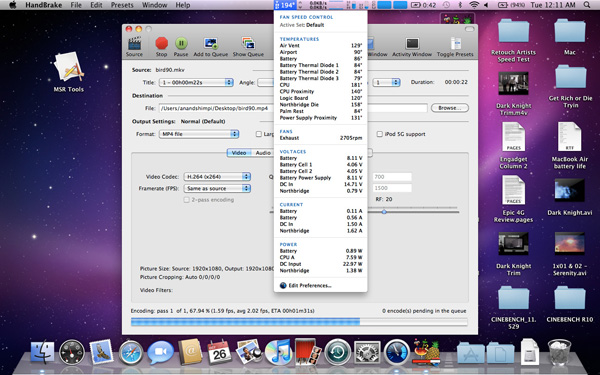
The 2008 MacBook Air under Load
Maximum temperature, at least reported by the MBA’s sensors, isn’t any lower on the new 13-inch than the 2008 I compared it to. Both CPUs hit roughly 84C (183F) under full load. But look at what happens to the chips after a minute at that load:
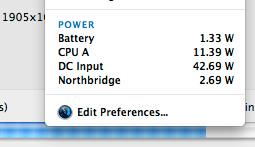 2010 13-inch MacBook Air |
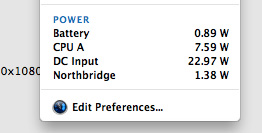 2008 13-inch MacBook Air |
iStat Menus reports the 1.86GHz Core 2 Duo in the 2008 system consuming only 7.59W, while the same CPU in the 2010 machine is drawing 11.45W. The 2008 machine is throttling back to reduce overall temperature while the 2010 system keeps going.
As a result, even the 11-inch MacBook Air will probably end up being as fast, if not faster than the 2nd generation 2008 13-inch MacBook Air. And our performance results confirm that:
| 11-inch MacBook Air (2010) vs. 13-inch MacBook Air (2008) | ||||||||
| Application Launch Test | Adobe Photoshop CS4 | Aperture RAW Import | Cinebench R10 - 1CPU | Cinebench R10 - XCPU | Quicktime H.264 Transcode | |||
| Apple 11-inch MacBook Air (2010) - 1.4GHz Core 2 Duo | 27.8 seconds | 72.4 seconds | 1.29 PPS | 1612 | 2967 | 33.1 fps | ||
| Apple 13-inch MacBook Air (2008) - 1.86GHz Core 2 Duo | 26.4 seconds | 71.3 seconds | 1.20 PPS | 2046 | 2882 | 30.1 fps | ||
You'll notice the less CPU intensive tasks are quicker on the old 13-inch system as the CPU isn't able to get hot enough to trigger Apple's throttling. The single threaded Cinebench test is the best example of this. The 26% performance advantage jibes with the 33% increase in CPU clock speed (it's actually a little low, most likely because the old CPU still isn't running at full speed even in this test). But now look at the heavier tests - the multithreaded Cinebench test and the Quicktime encode. Both of these stress both cores and drive TDP up, which forces Apple to pull clock speed back down. We wondered how Apple was able to cram such a high speed CPU into such a thin chassis as early as it did, now we know.
In practice I found the 2008 13-inch MBA launched applications quicker (short bursts of full clock speed), but after prolonged use or completing CPU intensive tasks it was tough to tell apart from the new 11-inch. What's even more troublesome is that Apple's aggressive clock throttling went relatively undetected until now. This is something I'm going to have to devise tests for and pay more attention to in future reviews. Sneaky, Steve, sneaky.
External Temperatures and Noise
The old MacBook Air chassis had a few dozen slits cut out of the aluminum for ventilation. The new MacBook Air chassis hides the ventilation slits between the base of the unit and the hinge. You can’t see them, but they’re there.
The slits are smaller than they were on the old chassis, which means moving air through them at the same rate sounds louder than before.
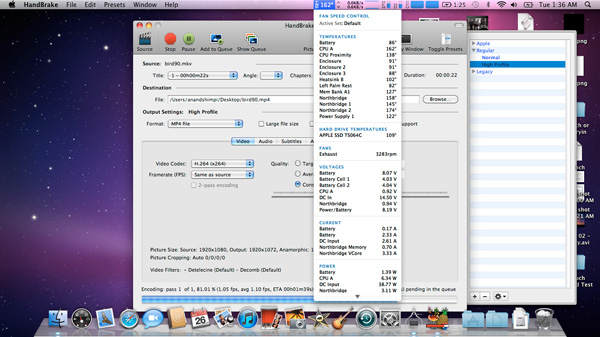
The 11-inch MacBook Air under Load
The CPU in the 11-inch model, even when under heavy loads, likes to stay at or below 72C (162F). At that temperature, the internal fan doesn’t spin above 4000 RPM (usually down below 3400). The 13-inch MacBook Air however is far more likely to generate noise. Running our simple Handbrake test the CPU will peak at over 82C (~180F) and the system’s internal fan will ramp up to over 6K RPM to compensate. Not only does the chassis get hot, but the fan gets audible. It’s still too small of a fan to really be considered loud in the grand scheme of things, but it’s loud enough to be annoying.
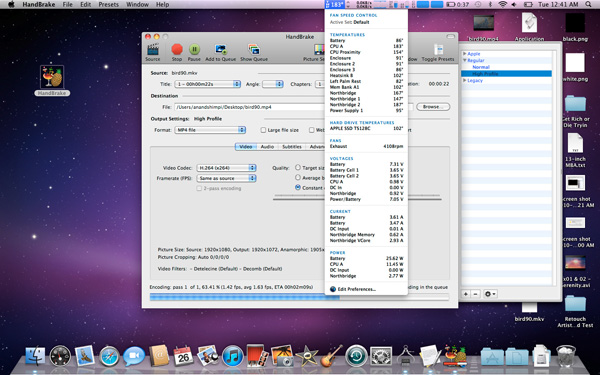
The 13-inch Macbook Air under Load
The surface temperature of the new 13-inch MacBook Air easily gets as high as the 2008 model. I measured a peak of 38.9C (102F) on both the 2008 and 2010 13-inch models. The 11-inch never broke 38C (100F).
Even casual use can ramp up temperatures pretty quickly. Just having a few websites open in the background that use Flash or other CPU intensive elements can slowly cause the MBA’s internal temperatures to rise. And now you’re beginning to see why Apple doesn’t install Flash on these things by default.
The danger zone is the upper left corner of the system, near the hinge. There’s only a single fan that cools both the CPU and GPU in the Air’s very tight enclosure. This is where that fan sits.










185 Comments
View All Comments
bigboxes - Wednesday, October 27, 2010 - link
Get it through your thick skull, an Apple is not a Ferrari. It's just another pc. An overpriced pc. As soon as you come to that realization you'll sleep better at night and save your $$.MeesterNid - Wednesday, October 27, 2010 - link
Errr...it sure seems like your skull is much thicker there buddy as he just gave you solid, logical reasoning and all you did was post incoherent blabbering about how Apple is not a Ferrari. You should try searching Google for the meaning of a "metaphor" there.But alas, I fear logic and reason do not fit into your "reality" filtered through, what's probably baseless, anti-Apple bias.
Good day.
bigboxes - Wednesday, October 27, 2010 - link
I know what a metaphor is. Do you really think I thought that an Apple PC is a car with four wheels that you can transport you from point A to point B using an internal combustion engine? Really?So, since you need clarifying... *sing along with me*... an Apple Computer is just another PC... an overpriced PC. A pretty PC with no cutting edge technology, but still more expensive nonetheless. No anti-Apple bias on my part because I point out the obvious. And no, Apple is not a BMW either (another metaphor in case you think I am mistaking a PC for an automobile).
synaesthetic - Wednesday, October 27, 2010 - link
Apple is more like a Lexus.A more expensive and shinier rebranded Toyota--err, PC.
=)
JVC8bal - Wednesday, October 27, 2010 - link
A Lexus is nothing like a base Toyota. They use separate unibodies, engines, etc. and only share little things like cabling and mirrors - as do all car brands and their platform strategies. Let's not forget the extra engineering that goes into quality or a quiet ride.You obviously have not owned a Lexus or are intimately familiar with - and judging from your witt, never will.
michael2k - Wednesday, October 27, 2010 - link
A Mac is nothing like a base PC. They use separate cases, batteries, motherboards, etc. and share only little things like connectors and ports - as do all PC brands and their platform strategies. Let's not forget the extra engineering that goes into quality or superior battery life.You obviously have not owned a Mac or are intimately familiar with - and judging from your wit, never will.
UltimateTruth - Monday, November 1, 2010 - link
"A Lexus is nothing like a base Toyota. They use separate unibodies, engines, etc. and only share little things like cabling and mirrors "I'm sure he's not talking about base Toyotas. And yes, models do share MANY common components from little things like hose clamps, electrical connectors up to engines and transmissions in their platforms.
The DI V8 in the bloated 350 IF-S is the same as used in the home market Toyota Crown. Variants are used in Tundras and Sequoias.
Toyota and it's subsidiaries makes the components. Lexus is just an upscale brand of Toyota Motor Co..
MeesterNid - Wednesday, October 27, 2010 - link
Brother, your ability to carry on a coherent, rational debate with adults needs practice. Allow me to illustrate:1. While my assertion that you do not understand the meaning of the word metaphor was clearly sarcastic you proceed to define it in your response making it look like you either really didn't know what it meant or felt insecure enough to have to prove your knowledge.
2. You, once again, spout unsubstantiated nonsense about Apple being "just another PC" while in fact Apple does a good bit of original design in their products unlike other PC OEMs (i.e. you should put forward, or at least attempt to, some reasoning that lead you to your conclusion).
3. Your statement that Apple is not a BMW is redundant to your previous one of it not being a Ferrari, but beyond that you bring that comparison up for no reason. That just makes your previously illogical ranting sound childish.
I'm not even going to attempt to debate your statement about your not being biased "because [you] point out the obvious" as I'm afraid reason may be lost on you.
bigboxes - Wednesday, October 27, 2010 - link
So, if I feel that Apple's products are underwhelming and overpriced then I must be biased. I see... :eyeroll:Use all the metaphors you want. Misinterpret my post for your selfish reasons that only you know.
It's still just a PC. I don't care what OS it uses. If you actually want to compare technical specs and features then we have a discussion. But that's not really what you want. You're off on some mission defending the honor of your beloved Apple. <i>It's Sir MeesterNid and his knights of the stupid table here to save your honor Miss! At your service.</i>
You know it's the same Intel cpu or did Apple do some design work there? It is thin like a cracker. Did you plan to use it as a frisbee? Make sure you buy the insurance.
tim851 - Wednesday, October 27, 2010 - link
And Ferrari is just another car. If you think there's $200k of engineering in there, your skull is thicker than mine. The main reason for the high price is that Ferrari positions themselves in a certain market segment. Price elasticity is given though, they would move more cars if they were cheaper. They just don't want to. Producing more cars creates new hassles and puts them in a different market position.Also, the primary benefit of a Ferrari - that is as a means of transportation - is rather bad, as they often seat only two people, have little luggage space, low MPG, frequent service intervals, high cost of operation.
The technical superiority - i.e. the performance - doesn't matter on public roads. A Ferrari won't get you anywhere quicker than a Ford.
People buy them because they are fun, they are pretty and they are representative. Buying a Ferrari is a more emotional act than buying an Apple.
And I, for one, don't own an Apple. I don't care about those secondary and tertiary values and prefer a cheaper PC. That doesn't mean that Apple's market strategy is wrong - it's just wrong for me. Their overwhelming success shows that it's right in general.